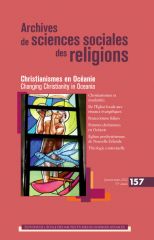 Le numéro 157 des Archives de sciences sociales des religions, que j'ai coordonné, vient de paraître. Intitulé "Christianismes en Océanie - Changing Christianity in Oceania", il rassemble 8 contributions et marque l'aboutissement d'un travail collectif entamé en 2008 à l'occasion de journées d'études dont j'avais alors parlé ici.
Le numéro 157 des Archives de sciences sociales des religions, que j'ai coordonné, vient de paraître. Intitulé "Christianismes en Océanie - Changing Christianity in Oceania", il rassemble 8 contributions et marque l'aboutissement d'un travail collectif entamé en 2008 à l'occasion de journées d'études dont j'avais alors parlé ici.
The issue #157 of the Archives de sciences sociales des religions has just been released. This publication that I've coordinated includes 8 contributions and is the main outcome of a collective work which began in 2008 with a two-day workshop held in Paris (see here).
Vous trouverez ci-dessous le texte de présentation de ce numéro, ainsi que le sommaire. Pour lire le résumé de chaque article, il suffit de cliquer après les titres.
You will find below a short presentation of this issue and the table of contents. To read the abstract of each article, just click after the title.
Bonne lecture.
Présentation. Au cours des trente dernières années, le christianisme a changé en Océanie, dans un contexte de profond changement social marqué notamment par l’urbanisation et l’intensification des migrations et sous l’effet d’une confrontation croissante entre des églises héritières des missions du 19ème siècle et les formes concurrentes du christianisme mondial – en particulier les plus récentes, 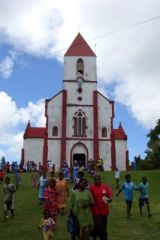 évangéliques et charismatiques.
évangéliques et charismatiques.
L’anthropologie du christianisme a changé, elle aussi. Les auteurs de ce numéro cherchent à prendre la mesure de cette double évolution, en associant l’exploration des christianismes d’Océanie et une réflexion collective sur les méthodes et les approches théoriques par lesquels nous en rendons compte. Ils mettent ainsi en lumière l’intérêt que représentent ces terrains océaniens dans la perspective d’une anthropologie du christianisme et pour une compréhension approfondie des rapports entre christianisme et cultures.
Des montagnes de Papouasie Nouvelle-Guinée jusqu’aux communautés polynésiennes des banlieues urbaines de Nouvelle-Zélande, en passant par la Polynésie française ou Fidji, l’analyse des transformations contemporaines du christianisme océanien invite à dépasser une compréhension trop univoque en termes d’acculturation ou de domination culturelle occidentale, pour prêter davantage attention aux conditions de la rencontre entre une histoire chrétienne locale et les dynamiques actuelles de la globalisation religieuse.
Presentation. Christianity has changed in Oceania in the last 30 years, in a context of deep social change marked by the impact of migrations and urbanisation, and under the influence of a growing competition between the churches stemming from the 19th Century missions and the new forms of 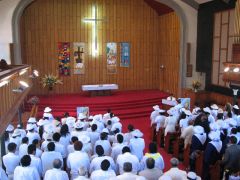 global Christianity - especially Evangelicals and Charismatics.
global Christianity - especially Evangelicals and Charismatics.
Anthropology of Christianity has changed too. The authors of this issue aim to measure the effects of this double evolution, by articulating an exploration of Pacific Christianities with a collective reflection on the methods and theoretical tools we use to analyse them. Thus they point out the interest of Pacific fields of research in the perspective of an anthropology of Christianity and for a deeper understanding of the relationships between Christianity and local cultures.
From the mountains of Papua New Guinea to the Pacific Peoples communities of New Zealand suburbs, in French Polynesia or in Fiji, the observation of Pacific Christianities invites us to move beyond a too simplistic description in terms of acculturation or Western cultural domination, and to give more attention to the circumstances of the encounter between Pacific Christian local histories and the contemporary dynamics of religious globalisation.
![]() Sommaire / Table of Contents
Sommaire / Table of Contents
Yannick Fer — Introduction
Simon Coleman — Christianities in Oceania: “Historical Genealogies and Anthropological Insularities” (résumé - abstract)
Manfred Ernst — Changing Christianity in Oceania: a Regional Overview (résumé - abstract)
Yannick Fer — Le protestantisme polynésien, de l’Église locale aux réseaux évangéliques (résumé - abstract)
John Barker — Secondary Conversion and the Anthropology of Christianity in Melanesia (résumé - abstract)
Jacqueline Ryle — Burying the Past-Healing the Land: Ritualising Reconciliation in Fiji (résumé - abstract)
Joel Robbins — Spirit Women, Church Women, and Passenger Women: Christianity, Gender, and Cultural Change in Melanesia (résumé - abstract)
Gwendoline Malogne-Fer — Les protestantismes polynésiens à l’épreuve du genre. L’exemple de l’Église presbytérienne de Nouvelle-Zélande (résumé - abstract)
Gilles Vidal — La contextualisation de la théologie protestante comme lieu de changement du christianisme en Océanie (résumé - abstract)
Illustrations: église de la roche à Maré (P-J. Noël) ; culte samoan à la Wellington Methodist Parish (G. Malogne-Fer)
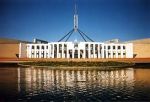 In August 2010, the last Australian federal elections didn’t give any majority in the Chamber of Representatives. The Labor Party led by Julia Gillard finally formed a minority government with the support of one Green MP and three independent MPs. In the second house of Parliament - the Senate - the
In August 2010, the last Australian federal elections didn’t give any majority in the Chamber of Representatives. The Labor Party led by Julia Gillard finally formed a minority government with the support of one Green MP and three independent MPs. In the second house of Parliament - the Senate - the  Marion Maddox is Associate Professor at Macquary University in Sydney and director of the Centre for Research on Social Inclusion. She is a specialist of the relations between religion and politics and the author of
Marion Maddox is Associate Professor at Macquary University in Sydney and director of the Centre for Research on Social Inclusion. She is a specialist of the relations between religion and politics and the author of  does not believe in human-made climate change,
does not believe in human-made climate change,  Yet the Greens have a very strong Christian element. Greens Deputy Leader, Tasmanian Senator Christine Milne has been a member of the Advisory Committee to Catholic Earthcare Australia, an agency of the Catholic Bishops' Commission for Justice and Development. One Greens candidate who narrowly missed election, as Senator for the Australian Capital Territory [New South Wales], was Lin Hatfield Dodds, a practising Christian and former National Director of UnitingCare Australia, the social service organisation for the Uniting Church, Australia's third-largest denomination.
Yet the Greens have a very strong Christian element. Greens Deputy Leader, Tasmanian Senator Christine Milne has been a member of the Advisory Committee to Catholic Earthcare Australia, an agency of the Catholic Bishops' Commission for Justice and Development. One Greens candidate who narrowly missed election, as Senator for the Australian Capital Territory [New South Wales], was Lin Hatfield Dodds, a practising Christian and former National Director of UnitingCare Australia, the social service organisation for the Uniting Church, Australia's third-largest denomination. The magazine no doubt guessed many of its readers' responses correctly; but a smaller number of Australian evangelicals would have been quietly celebrating the fact that someone was breaking the stereotype of them as conservative activists with conservative haircuts and right wing politics!
The magazine no doubt guessed many of its readers' responses correctly; but a smaller number of Australian evangelicals would have been quietly celebrating the fact that someone was breaking the stereotype of them as conservative activists with conservative haircuts and right wing politics!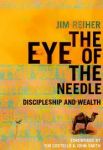 "Many Australian Pentecostals and evangelicals have been influenced by an American movement called 'prosperity gospel' or 'Word of Faith', which teaches that God wants Christians to be rich, and if you pray the right way you will receive financial prosperity. The Eye of the Needle was Reiher's theological challenge to remember the biblical message about social justice. Since 2007, he is part of a ministry called
"Many Australian Pentecostals and evangelicals have been influenced by an American movement called 'prosperity gospel' or 'Word of Faith', which teaches that God wants Christians to be rich, and if you pray the right way you will receive financial prosperity. The Eye of the Needle was Reiher's theological challenge to remember the biblical message about social justice. Since 2007, he is part of a ministry called 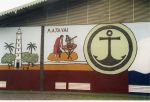 In most of the Polynesian islands, an annual event commemorates the arrival of the first (generally Protestant) missionaries. People dance, sing and re-enact the original scene, when European missionaries or Polynesian “teachers” – notably those from the Society Islands – on one side, and the local populations on the other side, met together. Thus in French Polynesia, March 5 – a public holiday – is officially the day of “Gospel’s arrival”, commemorating the arrival in 1797 of the Duff, a sailing ship chartered by the London Missionary Society. In addition to this Tahitian date, many islands celebrate the landing of Christianity on their own shores. The performance often includes many comic relieves, with actors dressed in Western 19st century suits and wearing top-hats miming wild-eyed British missionaries facing new languages and customs.
In most of the Polynesian islands, an annual event commemorates the arrival of the first (generally Protestant) missionaries. People dance, sing and re-enact the original scene, when European missionaries or Polynesian “teachers” – notably those from the Society Islands – on one side, and the local populations on the other side, met together. Thus in French Polynesia, March 5 – a public holiday – is officially the day of “Gospel’s arrival”, commemorating the arrival in 1797 of the Duff, a sailing ship chartered by the London Missionary Society. In addition to this Tahitian date, many islands celebrate the landing of Christianity on their own shores. The performance often includes many comic relieves, with actors dressed in Western 19st century suits and wearing top-hats miming wild-eyed British missionaries facing new languages and customs.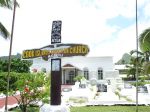 It may be in the Cook Islands, a tiny Polynesian State (in free association with New Zealand) located west of French Polynesia, that this annual performance is the more high-colored. Here too, each island used to have its own commemoration day, for example July 25 on the main island, Rarotonga. But on this island, the biggest event is now hold on October 26 and commemorates the arrival of missionaries led by the Rev. John Williams in the island of Aitutaki on October 26th 1821. It's a national celebration: “the National Gospel Day”. At this occasion, the six parishes of the Cook Island Christian Church (the Protestant Church stemming from this missionary history) prepare religious dramas – Nuku in local tongue. These nuku not only re-enact the October 26 event, but also show some significant events of recent history: in 2007, spectators could even watch a local version of the suicide aircraft attacks on The World Trade Center! Until the 1990s, it was a competition between the parishes, then the competitive side of things was dropped. Today, even if this no more a matter of official competition, parishes still compete on imagination. The website
It may be in the Cook Islands, a tiny Polynesian State (in free association with New Zealand) located west of French Polynesia, that this annual performance is the more high-colored. Here too, each island used to have its own commemoration day, for example July 25 on the main island, Rarotonga. But on this island, the biggest event is now hold on October 26 and commemorates the arrival of missionaries led by the Rev. John Williams in the island of Aitutaki on October 26th 1821. It's a national celebration: “the National Gospel Day”. At this occasion, the six parishes of the Cook Island Christian Church (the Protestant Church stemming from this missionary history) prepare religious dramas – Nuku in local tongue. These nuku not only re-enact the October 26 event, but also show some significant events of recent history: in 2007, spectators could even watch a local version of the suicide aircraft attacks on The World Trade Center! Until the 1990s, it was a competition between the parishes, then the competitive side of things was dropped. Today, even if this no more a matter of official competition, parishes still compete on imagination. The website